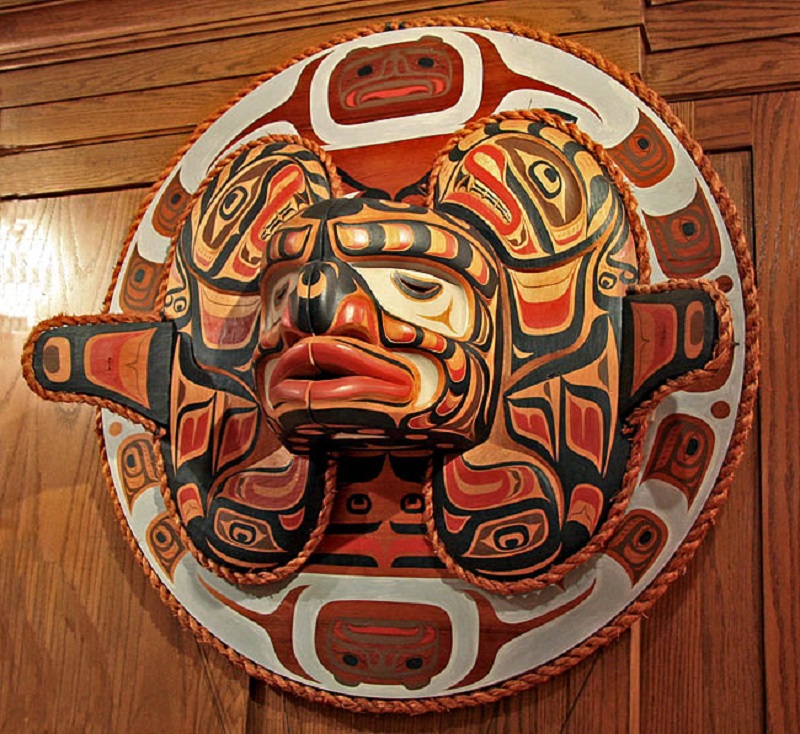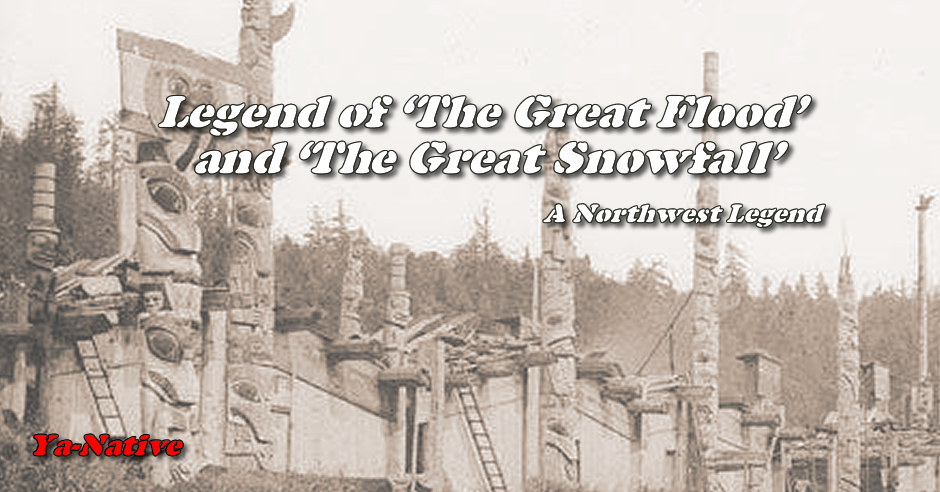
The following notes on the cosmogony [theories of creation] and history of the Squamish Indians of British Columbia, a sept of the great Salishan stock, were gathered by myself [Professor Charles Hill-Tout] from an aged Indian of that sept sometime last summer [1896]. Through the kindness of the Roman Catholic bishop of the district, Bishop Durieu, I received a cordial reception at the hands of the chief men of the tribe, and on learning what I wanted they brought out of his retirement the old historian of the tribe.
He was a decrepit creature, stone-blind from old age, whose existence =till then had been unknown to the old bishop, who himself has this tribe in charge. I am disposed, therefore, to think that this account has not been put into English before. I first sought to learn his age, but this he could only approximately give by informing me that his mother was a girl on the verge of womanhood when Vancouver sailed up Howe Sound at the close of last century. He would, therefore, be about 100 years old.
His native name, as near as I could get it, is .Mul‘ks.. He could not understand any English, and as his archaic Squamish was beyond my poor knowledge of the language, it was necessary to have resort to the tribal interpreter. The account will, in consequence, be less full and literal.
Before the old man could begin his recital, some preparations were deemed necessary by the other elderly men of the tribe. These consisted in making a bundle of short sticks, each about six inches long. These played the part of tallies, each stick representing to the reciter a particular paragraph or chapter in his story. They apologized for making these, and were at pains to explain to me that these were to them what books were to the white man. These sticks were placed at intervals along a table round which we sat, and after some animated discussion between the interpreter, who acted as master of ceremonies,
and the other old men as to the relative order and names of the tallies, we were ready to begin.
The first tally was placed in the old man‘s hands and he began his recital in a loud, high- pitched key, as if he were addressing a large audience in the open air. He went on without pause for about ten minutes, and then the interpreter took-up the story. The story was either beyond the interpreter‘s power to render into English, or there was much in it he did not like to relate to a white man, for I did not unfortunately get a fifth of what the old man had uttered from him, and it was only by dint of questioning and cross- questioning him that I was enabled to get anything like a connected narrative from him at all. The old man recited his story chapter by chapter, that is, tally by tally, and the interpreter followed in like order. The following is the substance of what I was able to record:
In the beginning there was water everywhere and no land at all. When this state of things had lasted for a long while, the Great Spirit determined to make land appear. Soon the tops of the mountains showed above the water and they grew and grew =till their heads reached the clouds. Then he made the lakes and rivers, and after that the trees and animals. Soon after this had been done, .Ka-Ia‘na., the first man, was made. The Great Spirit bestowed upon him the three things an Indian cannot do without, viz., a wife, a chisel or adze, and a salmon trap. Ka-Ia‘na was a good man and obeyed the Great Spirit‘s commands, and in course of time his wife bore him many sons and daughters, who spread-out over the land and peopled it. When the land was full of people and Ka-Ia‘na had grown very old, the Great Spirit took him away one day and the people saw him no more. Now, as Ka-Ia‘na had advanced in years the people had become very wicked and vexed the Great Spirit. And after he had left them they became worse. When this state of things had been going on for a long time; the Great Spirit made the waters rise-up over all the land above the tops of the highest mountains, and all the people were drowned except one man named Cheatmuh, the first-born of Ka-Ia‘na, and his wife. These two escaped in their canoe, which floated about on the water for a long time, and at last, when they were nearly dead with hunger, settled on top of a high mountain which was not quite covered with water. After this the water subsided, and Cheatmuh and his wife descended from the mountain and built themselves a house, and in course of time repeopled the land again with their offspring. A long interval now went by and the people were happy and prosperous. Many salmon came up the Squamish [River] every season, and there was food for everybody and to spare.

But the Great Spirit became angry with them again a second time after Cheatmuh‘s death, and this time he punished them by sending a great snow-storm upon the land. Day after day, and moon after moon, the snow fell in tiny flakes, covering everything and hiding all the land, and the streams, and the rivers and the trees. The snow was remarkable for its extreme fineness, and it penetrated everywhere. It came into their houses and put out the fires, and into their clothes and made them wet and cold. (In this part of his recital the old man was exceedingly interesting and graphic in his description, the very tones of his voice lending themselves to his story, and I had gathered, long before the interpreter took-up the story, that he had told of something that was very small and had penetrated everywhere.) Soon all the stores of fish and all available firewood was consumed, and no more could be got. Starvation and cold assailed on every side, and soon the children and old people began to die in scores and hundreds. But still the snow came down and the misery of those that were left increased. Dead bodies lay
around everywhere, dead and dying lying together. (Here the old man‘s voice was hushed to a plaintive wail, and the faces of his audience were an eloquent index of the tragic interest of this story of their ancestors‘ misfortunes.)
Everything that could possibly afford sustenance was eagerly sought out and eaten. The hair was scraped from their store of skins, and the latter, soaked in the snow to make them soft, were then torn into pieces and devoured. But soon even this source of supply failed them, and their only hope now lay in the approaching salmon season. But when this long looked-for relief came it was found that the salmon were so thin that there was nothing on them but the skin and bones. It was impossible to cure salmon of this description; moreover, they did not come in their usual numbers, and soon this miserable supply failed them also. By the help of this poor diet the more hardy of them managed to keep body and soul together for some time longer, but all who were sickly and weak gradually died-off, so that in a little time there remained but a few only of the whole tribe alive.
All this time the snow had continued to fall, though it was long past the beginning of summer; and now even the salmon skins and bones were consumed, and all had died of starvation but two, a man and his daughter who lived apart by themselves. These two it seems had managed better than the rest. They were the fortunate possessors of a dog, which they killed after the salmon had failed them and this they ate, bit by bit, as long as it lasted. They also burrowed down through the snow to the moss beneath, which they gathered, and after wiping the slime of the salmon on it for flavouring; they then made soup from it. This, together with the dog, had enabled them to outlive all the rest of the tribe.
But still the snow came down, and now they also had exhausted their resource and nothing remained to them but to lie down and die as the others had done. As they sat lamenting their lot, the man happened to look soundwards, and then he saw a large fish hawk swoop down upon the water and rise again with a large salmon in its claws. Hastily getting out his canoe he launched it, and with his bow and arrows ready at hand, he paddled out to sea and presently got within range of the eagle and shot an arrow at it. The arrow went home and the bird fell with the fish still in its claws. He quickly secured both and returned to his daughter with them. By means of this fish and bird they were enabled to sustain themselves for some time longer, and by the time food was consumed a great change began to take place.
The snow at last stopped falling and the sun appeared, and a great and rapid thaw set- in. In a short space of time the great white covering of snow sank down, and the long- hidden trees, and streams, and rivers, and land were seen once more. The man now took his daughter to wife, and from those two the land was in course of time once more repeopled. Times of plenty came back, and the people learned to forget the terrible punishment the Great Spirit had sent upon their forefathers.
But once again a dreadful misfortune befell them. This time it happened in this wise. One salmon season the fish were found to be covered with running sores and blotches, which rendered them unfit for food. But as the people depended very largely upon these salmon for their winter‘s food supply, they were obliged to catch and cure them as best they could, and store them away for food. They put-off eating them =till no other food was available, and then began a terrible time of sickness and distress. A dreadful skin disease, loath some to look upon, broke-out upon all alike. [The disease was most likely
smallpox.] None were spared. Men, women and children sickened, took the disease and died in agony by the hundreds, so that when the spring arrived and fresh food was procurable, there was scarcely a person left of all their numbers to get it. Camp after camp, village after village, was left desolate. The remains of which, said the old man, in answer to my queries on his head, are found today in the old camp sites or midden- heaps over which the forest has been growing for so many generations. Little by little the remnant [population] left by the disease grew into a nation once more, and when the first white men sailed up the Squamish [River] in their big boats [in 1792], the tribe was strong and numerous again. Following Vancouver‘s advent four generations have come and gone, the second of which was his [Mul‘ks] own.